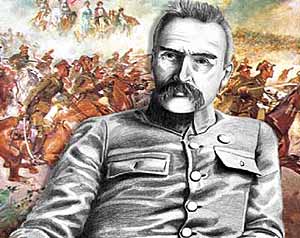25.10.2008
October 16, 2008 (the date of publication in Russian)
Grigory Tinsky, Alexander Rublev
POLISH-LITHUANIAN WARS FOR HISTORY
How Josef Pilsudski was equaled to Adolf Hitler
 It is hardly believable but true: in the center of Vilnius, in the building of the Central Post Office, one can purchase post envelopes with portraits of Joseph Stalin, Adolf Hitler and Josef Pilsudski, the caption saying: "They Organized Genocide of Lithuanians". Local Poles, who view Marshal Josef Pilsudski, Dictator of Poland in 1919-23 and 1926-35, as a national hero, are shocked. Meanwhile, Lithuanian rightists insist on their version of history. Painter Antanas Sakalis, the author of the idea, claims that he is basing upon historical facts, while Jonas Jarmalavicius, head of the distributing company, refers to freedom of expression.
It is hardly believable but true: in the center of Vilnius, in the building of the Central Post Office, one can purchase post envelopes with portraits of Joseph Stalin, Adolf Hitler and Josef Pilsudski, the caption saying: "They Organized Genocide of Lithuanians". Local Poles, who view Marshal Josef Pilsudski, Dictator of Poland in 1919-23 and 1926-35, as a national hero, are shocked. Meanwhile, Lithuanian rightists insist on their version of history. Painter Antanas Sakalis, the author of the idea, claims that he is basing upon historical facts, while Jonas Jarmalavicius, head of the distributing company, refers to freedom of expression.
Henryk Mickiewicz, director of the Bureau for Human Rights Monitoring in Lithuania, urges law enforcement bodies to intervene in the case, as "even human rights have borders". It is noteworthy that the sale of scandalous envelopes is not the first anti-Polish action in Lithuania. Two weeks ago, Kazimieras Garsva, chair of nationalist Vilnija Group, addressed the General Prosecutor's office with a demand to ban the Polish Party of Lithuania as "an anti-national and anti-constitutional association".
Lithuanian grudges against Marshal Pilsudski are historically substantiated. In 1920, Polish general Lucjan Zeligowski, fulfilling the Marshal's secret instruction, occupied Vilnius, then already the central city of an independent Lithuania, along with the adjacent territory. This operation in fact violated the agreements and treaties, signed by Pilsudski's regime with Soviet Russia and approved by Great Britain and France. Therefore, the takeover was officially interpreted as a mutiny of Vilnius-born Polish soldiers. An address, published on their behalf, said that they were "committed to fight for the native land against Germans, Lithuanians, and Bolsheviks". The occupants established the puppet state of Central Lithuania, and called elections of its parliament (the so-called Wilno Diet), which were boycotted by the Lithuanian population. "The war of giants has ended, the wars of the pygmies begin", wrote Winston Churchill about "Zeligowski's mutiny".
In 1922, Central Lithuania "voluntarily co-unified" with Poland, while Lithuanian nationalist activists were forced to escape from Vilnius. In all the Catholic churches of Vilnius except one, services were officiated in Polish.
Vilnius, as well as Klaipeda, was returned to Lithuania only due to the efforts of Joseph Stalin, one more "butcher of the Lithuanian nation". In September 1939, Vilnius was invaded by Soviet troops, and a month later, the city was conveyed to the Lithuanian Soviet Socialist Republic. However, during World War II, the territory of Central Lithuania was re-occupied by units of Armia Krajowa which also established control over several districts of Lithuania.
In Poland, the fighters of Armia Krajowa are esteemed as war heroes and martyrs of anti-Nazi resistance. In Lithuania, the attitude towards them is essentially different. In 2005, Seimas deputy Juozas Dringelis delivered a scandalous speech about the plan of Poland's occupation of Lithuania discovered during the restoration of the Bernardine Monastery in Vilnius. The plan reportedly considered the occupation of the whole Lithuania. According to Mr. Dringelis, Armia Krajowa's command decided to punish the Lithuanians for disloyalty and prepared a list of "untrustworthy persons" to be detained and executed after the Polish conquest.
While Warsaw officials deny those plans, the battles of Polish and Lithuanian historians are continued. The old scores they are paying off increasingly damage the relations of the two countries, questioning viability of the Polish-Lithuanian political axis.
Number of shows: 1693
 ENG
ENG 

 ENG
ENG 
